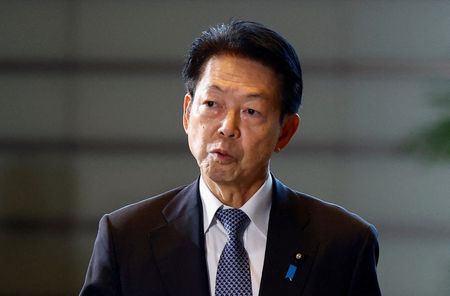By Satoshi Sugiyama and Kantaro Komiya
TOKYO (Reuters) – Japanese Prime Minister Shigeru Ishiba said on Thursday he was disappointed that his country did not win an exemption from President Donald Trump’s new tariffs and promised measures to help domestic industry deal with the fallout.
Japanese officials gave no indication on possible retaliation but questioned whether the tariffs were consistent with World Trade Organisation agreements and whether some of the U.S. calculations about Japan’s own tariffs were accurate.
The Nikkei share average fell 2.77% to close at an eight-month low after the announcement, wiping out 18.7 trillion yen ($127 billion) of market value.
Daiwa Institute of Research estimated that Trump’s 24% reciprocal tariffs on Japan could lower its real gross domestic product by 0.6% this year, after scant growth of 0.1% in 2024.
“We had been requesting that the U.S. government review its unilateral tariff measures at various levels and we are extremely disappointed and regret that such measures have been implemented nonetheless,” Ishiba told reporters.
Despite weeks of diplomatic efforts to change Trump’s mind, Japan woke up on Thursday to news that it would be subject to a reciprocal tariff based on what the U.S. said amounted to a 46% trade imbalance with its key ally.
A previously announced 25% tariff on all car imports took effect as scheduled on Thursday in the U.S., dealing a major blow to the Japanese auto industry which accounts for roughly 3% of GDP.
“We will continue to strongly urge the U.S. to review its measures,” Ishiba said, adding that he would speak directly to Trump if and when it was appropriate.
The government will also roll out support measures including making it easier for small businesses to receive state-backed loans, he said.
Trade Minister Yoji Muto said his ministry set up a task force on Thursday to analyse the tariffs’ impact, after his last-ditch plea to U.S. Commerce Secretary Howard Lutnick shortly before Trump’s Rose Garden announcement came up empty-handed.
Asked whether Japan would retaliate, Muto said: “We need to decide what is best for Japan, and most effective, in a careful but bold and speedy manner.”
The Financial Services Agency said it has called on banks to ensure smooth financing for firms affected by U.S. auto tariffs.
Trump also singled out Japan’s rice market, which he said imposed a 700% tariff – a figure that Japanese Agriculture Minister Taku Eto said was “illogical”.
“You can’t arrive at the figure through any calculation. It’s incomprehensible,” Eto said.
Under the WTO’s minimum access framework, Japan has a tariff-free rice import quota of about 770,000 metric tons a year and levies 341 yen per kg on anything over that amount.
($1 = 147.2500 yen)
(Reporting by Satoshi Sugiyama, Kantaro Komiya, Mariko Katsumura and Kaori Kaneko; Writing by Chang-Ran Kim; Editing by Edmund Klamann)











